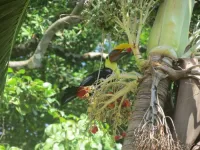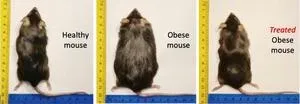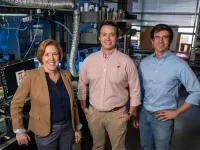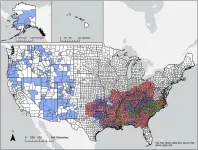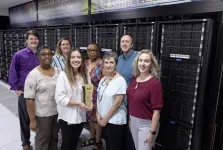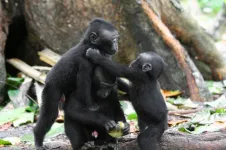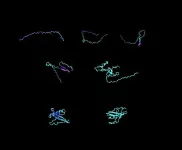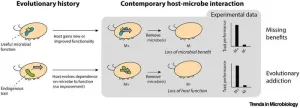(Press-News.org) Here’s a climate solution we can all get behind: don’t kill elephants. Or poach gorillas – or wipe out tapirs, hornbills, or other large-bodied wildlife that eat fruit and disperse large seeds. That’s because a new paper by the Wildlife Conservation Society (WCS) found that overhunting of these species makes forests less able to store or sequester carbon. The authors describe their results in the journal PLOS Biology.
The authors found that many of the mammals and birds targeted by illegal and commercial hunting are fruit eaters that disperse large seeds from tree species with high carbon stock capacity. The paper says the loss of these large frugivores such as primates, hornbills, toucans and others changes the composition of forests over time so that wind-dispersed or small-seeded tree species with lower wood density, and therefore lower amounts of carbon, become more prevalent.
Said the study’s lead author, Dr. Elizabeth Bennett, WCS Vice President of Species Conservation: “Many tropical forests have been described as ‘empty’ owing to loss of animals, often as a result of unsustainable subsistence or market hunting. Such hunting is known to have detrimental effects on target species, broader biodiversity, and the livelihoods and well-being of local communities. Less appreciated is the adverse impact of defaunation on the capacity of tropical forests to sequester and store carbon, which has implications for climate change.”
In the Neotropics, for example, defaunation of large primates and tapirs, which disperse seeds from large-seeded trees with higher wood density, is predicted to lead to long-term losses in above-ground tree biomass of an average of 3-6%, but to as much as nearly 40 percent. In central Thailand, tree species dependent on seed dispersal by large-bodied frugivores account for nearly one-third of the total carbon biomass.
The authors point out that emerging efforts to reduce net emissions by restoring tropical forests through planting seeds and seedlings typically involves small-seeded, largely second-growth species. Large-seeded, animal-dispersed tree species are typically underrepresented in seedlings acquired for restoration plantations. Once lost, restoration of animal populations is difficult, especially in the absence of their food sources, and this would constrain the capacity of restored forests to store and sequester carbon.
The findings underscore how ecologically intact forests — large, unbroken swaths of forests that are free of significant human-caused damage and containing full assemblages of wildlife — are of particular importance. High-integrity tropical forests are estimated to remove and store around 3.6 billion tons of CO2 per year (net) from the atmosphere.
Said co-author, Dr. John Robinson, Joan L. Tweedy Chair in Conservation Strategy at WCS: “Animals have a vital role in maintaining the integrity of such forests; those forests with their full complement of faunal species, at healthy population densities, sequester and store more carbon than those that have lost components of their fauna. Maintaining intact faunas is therefore a critical component of any strategy to conserve forests to address climate change.”
Another negative climate impact is the loss of wildlife from hunting that affects total forest carbon storage by removing carbon that is stored in animal bodies. For example, an adult forest elephant holds about 720kg (1,587 pounds) of carbon (2.64 tons of CO2e). The 11,000 elephants killed in a single national park in Gabon from 2004-2012 would therefore have meant the loss of 7,920 tons of carbon storage, equivalent to 29,040 tons of CO2e.
The authors note that there are already markets that value the carbon sequestration and storage capacity of forests, with REDD+ (Reduced Emissions from Deforestation and forest Degradation) being the most developed. These mostly voluntary markets have so far largely focused on the carbon in the forest trees and on reducing emissions by avoiding deforestation and forest degradation. As the loss of large animals degrades the carbon content of the forest, over both the short and long term, there is a market opportunity to incorporate the carbon bonus of an intact fauna to strengthen the existing biodiversity evaluations to include a demonstration of full ecological integrity of protected fauna.
Said Bennett: “Explicitly valuing wildlife for its role in the sequestration and storage of carbon in tropical forests, and creating a market for intact faunal assemblages, can potentially generate significant revenues for forest and hunting management. Such a market is one way to pay for the multi-faceted programs needed to conserve forests with their full complement of large faunal species, while also ensuring the nutritional health and well-being of local communities in carbon-friendly ways.”
###
Wildlife Conservation Society (WCS)
WCS combines the power of its zoos and an aquarium in New York City and a Global Conservation Program in more than 50 countries to achieve its mission to save wildlife and wild places. WCS runs the world’s largest conservation field program, protecting more than 50 percent of Earth’s known biodiversity; in partnership with governments, Indigenous People, Local Communities, and the private sector. It’s four zoos and aquarium (the Bronx Zoo, Central Park Zoo, Queens Zoo, Prospect Park Zoo, and the New York Aquarium ) welcomes more than 3.5 million visitors each year, inspiring generations to care for nature. Founded in 1895 as the New York Zoological Society, the organization is led (as of June 1, 2023) by President and CEO Monica P. Medina. Visit: newsroom.wcs.org. Follow: @WCSNewsroom. For more information: +1 (347) 840-1242. Listen to the WCS Wild Audio podcast HERE.
END
Want to fight climate change? Don’t poach gorillas (or elephants, hornbills, toucans, etc.)
2023-08-29
ELSE PRESS RELEASES FROM THIS DATE:
The MasSpec Pen offers the power of real-time tissue identification during surgery
2023-08-29
Surgery of the thyroid and parathyroid glands is most challenging, even to expert surgeons. These relatively small structures located in the neck are in contact with each other and share certain features, including color and tactile feel, making it difficult to visually identify them.
“In procedures to remove the thyroid, for example, inadvertent parathyroid removal occurs in up to 25% of cases. When removing parathyroid glands, a common cause of unsuccessful procedures is the failure to localize and resect the diseased parathyroid tissue, as thyroid nodules and lymph nodes can be mistakenly identified as parathyroid tissue,” said co-corresponding author Dr. James Suliburk, ...
Smart fabrics’ informed touch can tell you where to go
2023-08-29
HOUSTON – (Aug. 29, 2023) Personal devices feed our sight and hearing virtually unlimited streams of information while leaving our sense of touch mostly … untouched.
A wearable, textile-based device developed by Rice University engineers could help declutter, enhance — and, in the case of impairments — compensate for deficiencies in visual and auditory inputs by tapping this underused sensory resource.
“Technology has been slow to co-opt haptics or communication based on the sense of touch,” said Barclay Jumet, a mechanical engineering PhD student who is the lead author on a study published in Device. “Of the ...
AI-powered triage platform could aid future viral outbreak response
2023-08-29
AI-powered triage platform could aid future viral outbreak response
New Haven, Conn. —A team of researchers from Yale University and other institutions globally has developed an innovative patient triage platform powered by artificial intelligence (AI) that the researchers say is capable of predicting patient disease severity and length of hospitalization during a viral outbreak.
The platform, which leverages machine learning and metabolomics data, is intended to improve patient management and help health care providers allocate resources more efficiently during severe viral outbreaks that can quickly overwhelm local health care systems. Metabolomics ...
Study identifies geographic ‘hot spots’ for cigarette, firearm deaths in the US over two decades
2023-08-29
Smoking and firearms are among the leading causes of avoidable premature death in the United States. In 2021, 480,000 deaths in the U.S. were attributable to tobacco and more than 40,000 to firearms – both are legal yet lethal.
A new study from Florida Atlantic University’s Schmidt College of Medicine, and collaborators, now reveals geographically distinct areas of the highest death rates in the U.S. related to cigarettes as well as firearms, including both assault and suicide over two decades.
Results, published online ahead of print in the peer-reviewed journal Preventive Medicine, show all three measures – smoking, firearm-related assault and firearm-related ...
Jefferson Lab receives 2023 EPEAT Purchaser Award
2023-08-29
NEWPORT NEWS, VA – Staff and scientific users at the U.S. Department of Energy’s Thomas Jefferson National Accelerator Facility need all kinds of electronics to do their jobs, including computers, smartphones, printers and more. But instead of buying just any laptop off the shelf, the lab takes care to buy devices that meet sustainability standards when possible.
During a virtual ceremony on July 27, the Global Electronics Council presented Jefferson Lab with a 2023 EPEAT Purchaser Award for buying sustainable electronics in fiscal year 2022.
These devices meet ...
Male crested macaques more likely to respond to offspring screams recruiting support
2023-08-29
When infants are involved in agonistic conflicts, male crested macaques (Macaca nigra) are more likely to respond to screams from their own offspring. This is the conclusion of a recent study led by behavioural ecologist Professor Anja Widdig from Leipzig University and the Max Planck Institute for Evolutionary Anthropology in Leipzig as part of the Macaca Nigra Project (MNP). The researchers studied the behaviour of crested macaques in the Tangkoko Nature Reserve on Sulawesi, Indonesia, over a 24-month period (2008 to 2010). A special issue of the “International ...
CDI study of fevers in children during COVID-19 raises further questions
2023-08-29
An uptick in fevers detected among children at more than two dozen hospitals in North America during COVID-19 highlights the question whether there are normally more autoinflammatory disorders such as recurrent fevers among children going overlooked in non-pandemic times, according to a new study by researchers including a CDI physician-scientist.
The paper “Increase in pediatric recurrent fever evaluations during the first year of the COVID-19 pandemic in North America” was published by Frontiers in Pediatrics on Aug. 3, and includes Sivia Lapidus, M.D., pediatric rheumatologist, Joseph M. Sanzari Children’s ...
Study sheds light on why breast cancer survivors don’t take their medications, and what can be done about it
2023-08-29
For roughly 80% of breast cancer survivors, treatment doesn’t end with surgery, radiation and chemotherapy. Instead, for the next five to 10 years, doctors recommend that they take medication to block sex hormones, which can fuel tumor growth and spark recurrence.
The drugs, no doubt, are life-saving: they’ve been shown to cut risk of cancer recurrence by as much as half in patients with hormone receptor-positive tumors (HR+)—the most common form of breast cancer. Yet despite their promised benefits, 40% of patients stop taking them early and a third take them less frequently than directed.
New CU ...
Neural network helps design brand new proteins
2023-08-29
WASHINGTON, August 29, 2023 – With their intricate arrangements and dynamic functionalities, proteins perform a plethora of biological tasks by employing unique arrangements of simple building blocks where geometry is key. Translating this nearly limitless library of arrangements into their respective functions could let researchers design custom proteins for specific uses.
In Journal of Applied Physics, from AIP Publishing, Markus Buehler of the Massachusetts Institute of Technology combined attention neural networks, often referred to as transformers, with graph neural ...
Some hosts have an “evolutionary addiction” to their microbiome
2023-08-29
We’ve long known that hosts malfunction without their microbiome—whether they are missing key microbial species or are completely microbe free. This malfunctioning is usually explained by the need for microbes to perform unique and beneficial functions, but evolutionary ecologist Tobin Hammer of the University of California, Irvine, is questioning that narrative.
In a peer-reviewed opinion article publishing August 29 in the journal Trends in Microbiology, Hammer argues that, in some cases, microbes might not actually be helping their hosts; instead, microbe-free hosts might malfunction because they have evolved an addiction to their microbes. ...
